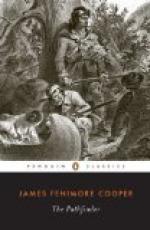“Yes, that’s it,” returned the guide, almost gasping for breath; “I’ll try to think of it in that way. You’re more befitting to be my daughter than to be my wife, you are. Farewell, Jasper. Now we’ll go to the canoe; it’s time you were on board.”
The manner in which Pathfinder led the way to the shore was solemn and calm. As soon as he reached the canoe, he again took Mabel by the hands, held her at the length of his own arms, and gazed wistfully into her face, until the unbidden tears rolled out of the fountains of feeling and trickled down his rugged cheeks in streams.
“Bless me, Pathfinder,” said Mabel, kneeling reverently at his feet. “Oh, at least bless me before we part!”
That untutored but noble-minded being did as she desired; and, aiding her to enter the canoe, seemed to tear himself away as one snaps a strong and obstinate cord. Before he retired, however, he took Jasper by the arm and led him a little aside, when he spoke as follows: —
“You’re kind of heart and gentle by natur’, Jasper; but we are both rough and wild in comparison with that dear creatur’. Be careful of her, and never show the roughness of man’s natur’ to her soft disposition. You’ll get to understand her in time; and the Lord, who governs the lake and the forest alike, who looks upon virtue with a smile and upon vice with a frown, keep you happy and worthy to be so!”
Pathfinder made a sign for his friend to depart, and he stood leaning on his rifle until the canoe had reached the side of the Scud. Mabel wept as if her heart would break; nor did her eyes once turn from the open spot in the glade, where the form of the Pathfinder was to be seen, until the cutter had passed a point that completely shut out the island. When last in view, the sinewy frame of this extraordinary man was as motionless as if it were a statue set up in that solitary place to commemorate the scenes of which it had so lately been the witness.
CHAPTER XXX.
Oh! let me only breathe the air,
The blessed air that’s breath’d
by thee;
And, whether on its wings it bear
Healing or death, ’tis sweet
to me!
MOORE.
Pathfinder was accustomed to solitude; but, when the Scud had actually disappeared, he was almost overcome with a sense of his loneliness. Never before had he been conscious of his isolated condition in the world; for his feelings had gradually been accustoming themselves to the blandishments and wants of social life; particularly as the last were connected with the domestic affections. Now, all had vanished, as it might be, in one moment; and he was left equally without companions and without hope. Even Chingachgook had left him, though it was but temporarily; still his presence was missed at the precise instant which might be termed the most critical in our hero’s life.




